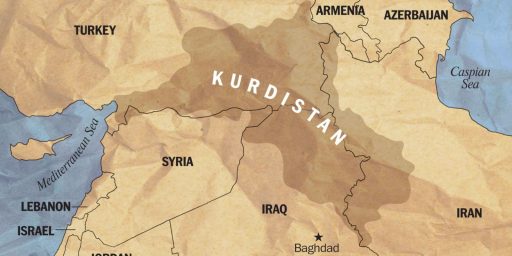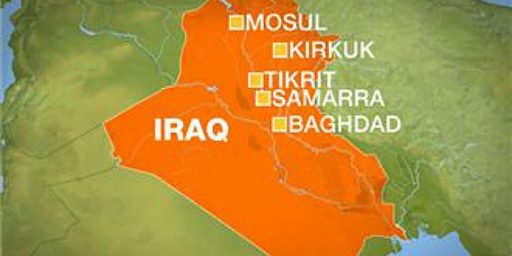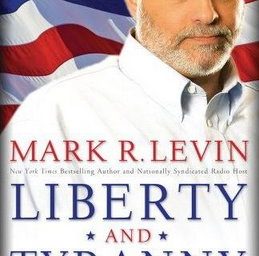Three Iraq Wars
Christopher Hitchens begins his latest Slate column with an easy set-up: “When people say that they want to end the war in Iraq, I always want to ask them which war they mean.”
“All of them!” is, of course, the rather obvious reply. In reality, though, it’s a bit more complicated than that.
There are currently at least three wars, along with several subconflicts, being fought on Iraqi soil. The first, tragically, is the battle for mastery between Sunni and Shiite. The second is the campaign to isolate and defeat al-Qaida in Mesopotamia. The third is the struggle of Iraq’s Kurdish minority to defend and consolidate its regional government in the north.
[…]
An American family that lost a son or a daughter in the defense of free Kurdistan or in the struggle against AQM could console itself that the death was in a worthwhile cause. The same could not be said for a soldier who fell in some murky street engagement, shot in the back by a uniformed policeman who was doing double duty as a member of a theocratic Shiite militia.
Quite so, I think, noting that the operative adjective is “worthwhile.” Still, one can’t very well withdraw from one of the conflicts and fight the other two?
The ability to distinguish among these different definitions of the “war” is what ought to define the difference between a serious politician and a political opportunist, both in Iraq and in America. The obliteration of political life and civil society by Saddam Hussein’s fascism has meant that most of the successor political figures are paltry (and the Kurdish exception to this exactly proves the point: Kurdistan escaped from Baathist control a full decade before the rest of Iraq did). It will take a good while before any plausible nonsectarian figures can emerge from the wasteland and also brave the climate of murder and intimidation that the forces of the last dictatorship, and the would-be enforcers of an even worse future one, have created. Meanwhile, it is all very well for Sens. Clinton and Levin to denounce the Maliki government and to say that he and his Dawa Party colleagues are not worth fighting for. But what do they say about the other two wars? Sen. Clinton in particular has said several times in the past that we cannot, for example, abandon the Kurds as we once did before. Should she not be asked if this is still her view? And did I miss what Sen. Levin had to say about the battle against AQM? The next election is rightly going to be fought, to a considerable extent, over the question of Iraq. Answers to these questions about that question are a test of seriousness that all voters should be keeping in mind.
Given that the Kurdish sector has, as Hitchens notes, been quasi-autonomous for some time now and that all of the prominent withdrawal plans being touted seem to include some rump force to deal with that issue, this “war” might be severable from the other two.
There seems no obvious way to separate the fight against AQI/AQM from the Sunni-Shia struggle. Indeed, it’s arguable that AQI/AQM ignited the latter with its carefully targeted attacks, notably the first attack on the Karbala shrine last January. For that matter, a Shiite thugocracy would probably be quite effective in hunting down a Sunni terrorist group; certainly, they have the necessary motivation.
Regardless, the question is whether the Sunni-Shiite war can be won during the span afforded by our military capability and capacity for maintaining some modicum of public support. The lack of strong, non-Baathist Iraqi political institutions that cuts across sectarian lines is indeed the reason it’s taking so long. Then again, that fact predated our invasion. So, while there are undoubtedly many wars and subwars within the larger War, the most controversial and unwinnable may be the only one that really matters.






If Hitch would cut back on the gin, that double-vision thing would calm right down…
Because dying to give the terrorist PKK a base of operations from which to destabilize Turkey and Iran is sooooo worthwhile.
Similarly dying to destroy a group that only exists due to our continued presence (AQI) is also worthwhile, I mean it’s not like five second after we pull out AQI will be lined up against a wall or anything…
Oh wait, no that’s exactly what will happen.
“An American family that lost a son or a daughter in the defense of free Kurdistan […] could console itself that the death was in a worthwhile cause.”
Most likely that cause would be inadvertantly causing a war, or at least low-level conflict, between the U.S. and Turkey, emboldening religous elements there against the secular government.
Not likely, at least not quickly. So long as the Sunni groups are afraid of Shia government deathsquads, they will use AQI as a source of weapons, training, and people. So AQI won’t be routed until the Sunni/Shia conflict is resolved. Of course, once that conflict is resolved, you will have Sunni vs. AQI and/or Sistani vs. Sadr conflicts. That’s not even mentioning the problems we’ll have with the Kurds and whomever comes out ahead in the Sunni/Shia conflict. Or the Kurds and Turkey for that matter.
For that matter, whenever someone says they want to win the war in Iraq, we should also ask them which war they mean.
As if that weren’t enough there’s also a gang war, a crime wave, and a counter-revolution (the “Ba’athist insurgency”).
I think that focusing our attentions on what’s in our national interests to pursue makes good sense and distinguishing what is from what isn’t isn’t completely obvious.
Tlaloc, I think that “fueled by” is fair comment. IMO “only exists” is over-reaching a trifle.
Michael:
granted it’s an exaggeration (hyperbole technically).
Dave Schuler:
Fair enough. Put it this way: The group that became AQI already existed before our invasion but they were nobodies. They had no clout, no power, no influence. Now they are somebodies because they can paint themselves as “the heroic resistance against foreign occupation.” Take away that huge PR factor and they pretty quickly will go back to being nobodies. The Shia will hand them great steaming hunks of their own butts. The Sunni will make some common cause with them but only in those places where the SHia dominate (which we already covered). Where the Sunni dominate they will kill AQI themselves.
The only thing giving them any degree of power or latitude is our presence.